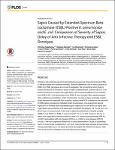Sepsis Caused by Extended-Spectrum Beta-Lactamase (ESBL)-Positive K. pneumoniae and E. coli: Comparison of Severity of Sepsis, Delay of Anti-Infective Therapy and ESBL Genotype
Sakellariou, Christian
Gürntke, Stephan
Steinmetz, Ivo
Kohler, Christian
Pfeifer, Yvonne
Gastmeier, Petra
Schwab, Frank
Kola, Axel
Deja, Maria
Leistner, Rasmus
Infections with extended-spectrum beta-lactamase-producing Enterobacteriaceae (ESBL-E) are associated with increased mortality. Outcome differences due to various species of ESBL-E or ESBL genotypes are not well investigated. We conducted a cohort study to assess risk factors for mortality in cases of ESBL-E bacteremia (K. pneumoniae or E. coli) and the risk factors for sepsis with organ failure. All consecutive patients of our institution from 2008 to 2011 with bacteremia due to ESBL-E were included. Basic epidemiological data, underlying comorbidities, origin of bacteremia, severity of sepsis and delay of appropriate anti-infective treatment were collected. Isolates were PCR-screened for the presence of ESBL genes and plasmid-mediated AmpC β-lactamases. Cox proportional hazard regression on mortality and multivariable logistic regression on risk factors for sepsis with organ failure was conducted. 219 cases were included in the analysis: 73.1% due to E. coli, 26.9% due to K. pneumoniae. There was no significant difference in hospital mortality (ESBL-E. coli, 23.8% vs. ESBL-K. pneumoniae 27.1%, p = 0.724). However, the risk of sepsis with organ failure was associated in cases of K. pneumoniae bacteremia (OR 4.5, p
No license information

